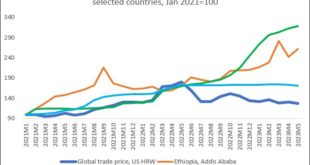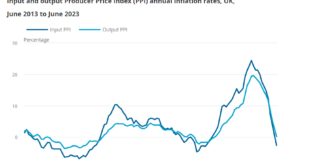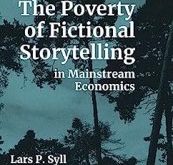My latest in The Conversation Share this:Like this:Like Loading...
Read More »Interview of S.Mavroudeas for EL CONFIDENTIAL on the state of the EU and the Greek economy
This is the English transcript of an interview of S.Mavroudeas for the spanish site EL CONFIDENCIAL (https://www.elconfidencial.com/). Its subject is the state of the EU and the Greek economy. The Spanish translation will appear on the 25th of August 2023. [embedded content] View this document on Scribd
Read More »Global food prices in “The rest of the world”
from C. P. Chandrasekhar and Jayati Ghosh The dramatic increase in global oil and food prices from the start of the Ukraine War did not reflect real global supply shortages or demand-supply imbalances. Rather, it reflected the impact of market concentration and financial activity in commodity futures markets, which enabled some large private players particularly global agribusinesses and financial companies to make a killing. This is now so evident from the data that it is more widely...
Read More »The economic consequences of tax cuts for the rich
from Lars Syll Given the lack of consensus in existing empirical analyzes and the difficulties of making causal inferences from macro-level panel data analyzes, it remains an open empirical question how cutting taxes on the rich affects economic outcomes. We believe the question is best answered by looking at the effects of major tax cuts packages, as the story of taxing the rich in the advanced democracies over the past 50 years is one of discrete and stark changes in policy … Our...
Read More »Job loss from going green is nothing like the loss of manufacturing jobs due to trade
from Dean Baker The United States suffered from a massive loss of manufacturing jobs in the 00s. This has come to be known as the “China Shock,” since it was associated with a flood of imports, especially from China, and a rapid rise in the U.S. trade deficit. In the decade from December of 1999 to December of 2009, the economy lost more than 5.8 million manufacturing jobs, or more than one in three of the manufacturing jobs at the start of the decade. The vast majority of this job loss...
Read More »The fragmentation of new media
Today, I signed up for Bluesky and Threads, taking a brief look at each of them, and announced my final departure from Twitter, to take place when Musk removes the Block feature[1]. Meanwhile I’m still using Mastodon as my main microblog along with this blog and Crooked Timber for long-form blogging. I’m trying to maintain a couple of Substack newsletters and commenting on Substack Notes. And I still post occasionally on Facebook. This is clearly too much, but it reflects the...
Read More »“So what has gone wrong?”
from this Nature editorial . . . income inequality within countries is rising, as measured by the Gini index, a measure of income distribution across a population. Globally, in the 15 years to 2019, economic output in terms of gross domestic product (GDP) roughly doubled, but the share of economic output earned by the workers producing the goods and services behind the increase fell from 54.1% in 2004 to 52.6% in 2019. So what has gone wrong? Between 2019 and 2020, the COVID-19 pandemic...
Read More »Core prices? More prices! Understanding inflation means looking at numerous sets of prices.
Producer prices in the UK are declining. Does this mean inflation is over? Hmmm… Many economists have difficulties understanding the present aftermath of an inflationary episode (which might be followed by new episodes…). Which is, considering their theoretical framework, understandable. They look at only one set of prices: consumer prices (or, in the case of derivatives ‘core prices’ and many others‘, even only at a subset of this set). Instead, they should expand their frame of...
Read More »Explanatory fictionalism in economics
from Lars Syll One of the limitations of economics is the restricted possibility to perform experiments, forcing it to mainly rely on observational studies for knowledge of real-world economies. But still — the idea of performing laboratory experiments holds a firm grip on our wish to discover (causal) relationships between economic ‘variables.’ If we only could isolate and manipulate variables in controlled environments, we would probably find ourselves in a situation where we with...
Read More »Weekend read: Ready for brain transparency? Amid the laughter of Davos, the machine is assimilating humans
from Norbert Häring A presentation on the technical monitoring of human brain functions at the annual meeting of the World Economic Forum in Davos has shined a spotlight on what ails our society: excessive faith in technology and too much efficiency without a worthwhile goal. As long as the machine runs like clockwork, it is considered irrelevant what it produces. From this diagnosis I derive recommendations on how we can change direction. Moderator Nicholas Thompson, CEO of the U.S....
Read More » Heterodox
Heterodox





